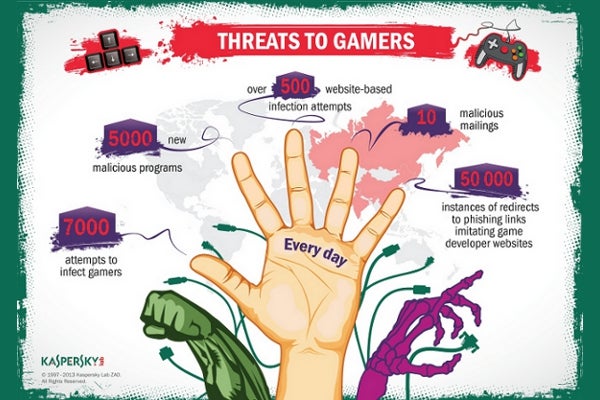Hackers target gamers with 7,000 daily attacks recorded

According to new research by Kaspersky Lab, gamers are now being targeted by cybercriminals, with 7,000 attempted attacks recorded daily in 2012.
Aiming to gain access to personal data including online gaming passwords and account-linked bank accounts, these hackers are also looking to obtain avatars and in-game items to sell for cash. An average of 10 emails containing malicious links and attachments are sent to gamers’ inboxes daily, with 500 attempts made against players using browser-based online games.
The number of malicious programs used to specifically target online games is growing rapidly, with 5,000 new malware options appearing every day.
Phishing websites are becoming the most widely used tactic for trapping gamers where cybercriminals launch websites that mirror those of official game developers. Gamers are asked to input their account username and passwords, which are then utilised by the site to access personal data. Kaspersky recorded 15 million attempted visits to one such website.
In fact, up to 50,000 users were redirected to a phishing site per day during 2012, but were saved by their malware detection software. Russia, China and India ranked as the world’s top countries at risk of gamer specific attacks for 2012, but cybercriminals target gamers playing online worldwide.
“First and foremost, one needs to be alert when receiving emails featuring, for example, a request from an online game’s admin servers for personal information about your account or an authorisation offer under some pretext. Don’t just click on the link right away – it could be a phishing site,” suggests Sergey Golovanov, malware expert at Kaspersky Lab.
“Next, don’t download unofficial patches from dubious sources – you could easily end up downloading a ‘bonus’ in the form of a Trojan that would then infiltrate your system and start stealing all of your passwords. And I don’t mean just for online games, but also for bank cards, if your bank offers online services.”
What do you think of the latest research from Kaspersky? What techniques to you use to keep your data secure when playing online? Let us know via the Trusted Reviews Facebook and Twitter pages or the handy comment boxes below.

